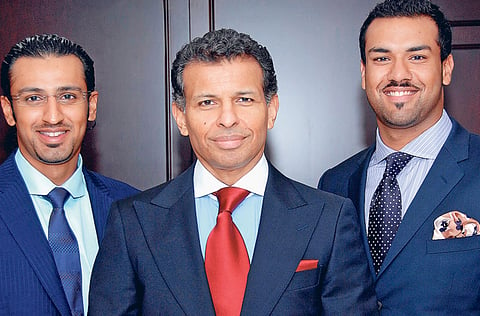GEMS, Dubai's largest private school operator, celebrates golden jubilee
Largest private school operator provides instruction to 100,000 children in 125 countries

Dubai: The growth of GEMS (Global Education Management Systems), a Dubai-born brand, from a shack of a school to a capillary network of educational institutions spanning the globe has kept pace with the growth of the emirate.
The golden jubilee is being celebrated this year, as chairman Sunny Varkey's parents started their private education business in Dubai in 1960.
"Dubai grew and we grew with Dubai," is how Varkey describes his success story in a nutshell. This ambitious businessman, hailing from a far-flung village in the Kottayam district of Kerala, India, says his teacher-parents who first set up a school for expatriate children in Dubai in the late sixties had no inkling that their academically disinclined progeny would turn education into what it is today — a global business.
Largest
Varkey's company is the biggest private-school operator in the world and it imparts K-12 education to over 100,000 children in 125 countries covering the GCC and Middle East, India, Europe, and Pacific and East Asia, in addition to having a good stake in the emirate's robust health care industry.
"My parents who came here to teach English language to locals established the Our Own English High School in 1968 in the Bastakiya area for expatriate children. When they were served with an eviction notice by the municipality, I took charge and moved the campus to Karama in 1979. Those portacabins were the bronze field from where at least a dozen of our schools including Dubai Modern High School, Cambridge High School, Kindergarten Starters, etc were later started," Varkey said.
He says that it was his successful health care business that opened his eyes to the potential of private sector education in a growing economy which was attracting a huge expatriate population. "I was running a medical clinic called Emirates Diagnostic Centre, which was doing extremely well, though there was a government medical sector. Then I realised that private sector can play an active role, and once it was happening, I started investing and reinvesting into schools because we saw the demand," said Varkey.
In the words of Shaikh Nahyan Bin Mubarak Al Nahyan, Minister of Higher Education and Scientific Research: "They [the Varkey family] recognised early on that more than [any] other single factor, it is the quality of education we provide young people that will determine the quality of life for all. Their work has demonstrated that education can be a major force for progress and stability."
As the education in the emirates progressed, so did Varkey's business. From Our Own English School to the recently opened GEMS World Academy that boasts five-star facilities, his education empire expanded to include a total of 25 schools in the UAE alone within a span of 30 years. In addition to that, GEMS runs and operates as well as provides educational support services to both public and private sectors around the world.
"From the beginning, I believed that every child has a right to quality education. And I named my education venture GEMS because I know parents are entrusting their most precious possession with us. And it was total coincidence that the idea that every child is a GEM was later expanded as Global Education Management Systems when we ventured beyond the borders of the UAE," said Varkey.
But his advocacy for a free market where school fees are not regulated has seen him locking horns with the local government authorities while many of GEMS parents continue to decry the practice of running education as a profit-driven business.
But Varkey vociferously defends his "education business", saying it is only fair to strike a balance between commerce and education.
"We have to repay the loans we take to make investments. We do not bother parents by asking for donations or charities. To sustain the business, we need to levy fees that suit the market. But we also know that we have to deliver quality consistently," says Varkey, adding that money he makes is only a byproduct of the quality work he does.
The fee structure that ranges from Dh5,000 to Dh100,000 annually in his schools, he argues, makes education accessible to all economic categories.



![Social media claims of cancellations dismissed; official updates to be shared through authorised channels. [Illustrative image]](http://media.assettype.com/gulfnews%2F2025-11-15%2Fx2mp12df%2Fexam.jpg?w=320&auto=format%2Ccompress&fit=max)